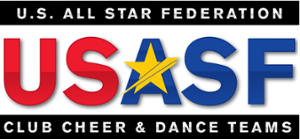Safe Sports for Kids: A Guide for Parents
October 29, 2020 11:59:29 AM EDT | USASF
October 29, 2020 11:59:29 AM EDT | USASF
Sports are a vital experience. Development, maturity and confidence are just a few of the benefits kids find in sports and other physical activities. The memories and lessons made through them will last a lifetime, and help teach dedication, accountability, leadership and other skills that make a difference as we grow.Unfortunately, in the excitement of signing up for a new sport, joining a team or hitting the field or gym, we can overlook safety. With any sport, there is risk. In fact, more than 2.6 million children are treated in emergency rooms for sports-related injuries every year.
In this blog, we’ve collected a few simple tips for parents as they help guide their children through sports.
Many kids are excited to immediately start a sport. There is always peer and social pressure pushing children toward sports. The questions below will help you evaluate any risk factors and can support safe practices and behaviors for anyone participating in a sport.
Ask if the league, gym, coach or organization sponsoring the sport has an action plan for preventing or treating injuries. The plan should cover proper warm-ups, medical kits in the field or gym, and cover any common injuries. A plan should focus on reducing the chance of serious injuries like a concussion.
Check that the sport or league emphasizes the importance of safety equipment and protective gear. Make sure they require the gear to be in good condition. Poorly fitted or damaged equipment can lead to injuries, not only to your child, but other athletes as well.
Winning is important, but a positive safety message and coaches who reinforce a model of safe behavior can prevent injuries before they happen. A good coach can focus on winning and “doing your best”, but also doing it safely and with good sportsmanship.
Participating in sports should be more than just playing. It should teach how to play the sport safely. There is a right and the wrong way to play any sport. Training and lessons not only help your athlete stay safe, they also keep everyone competing safe as well and teach skills that extend beyond the sport.
Hot and humid temperatures can lead to heat-related injuries and illness. Coaches should pay attention to the heat and allow athletes to adjust. It should be a standard practice to make sure athletes stay hydrated and have time to drink and rest.
Stretching and warming up before a game or competition can also prevent injury. Give athletes time to loosen up before they play. There is also a right and a wrong way to stretch, and time and attention should be given to teaching the athlete before a competition or practice begins.
Rules are there to enforce fair play and fun, but also to prevent injuries. Review the rules before joining a new team and make sure the people in charge of the team or sports organization enforce the rules fairly for everyone playing. Rules and enforcement officials that don’t support fair and safe play can quickly lead to games and competition that spiral out of control.
There are a lot of choices out there when it comes to sports for young athletes. No sport comes without risk, but there are some that have a higher risk.
According to recent studies, the most dangerous sports for kids are football, soccer and basketball. Other sports that report higher risk of injury include roller sports, baseball, and softball. Bouncing sports like a trampoline are another risk factor. This doesn’t mean a child shouldn’t play those sports, but it is important that you carefully evaluate the league and coaches before signing a son or daughter up to play.
It’s always a good idea to let a young child try out a sport before signing them up for a league or a team. Start by asking questions of the coach or other parents. In most areas, and for almost any sport, you’ll find plenty of options. Check for different teams, gyms or leagues and make sure the one you select is safe.
As always, any time your child is playing make sure the focus is not just on winning, but also fun.


The U.S. All Star Federation (USASF) has a mission to support and enrich the lives of our All Star athletes and members. We strive to provide consistent rules and safety guidelines, drive competitive excellence and promote a positive image for the sport. The USASF credentials coaches, certifies legality officials and sanctions events - all with the goal to provide the safest possible environment in which athletes may train and compete. Founded in 2003, we are a not-for-profit corporation established in Tennessee and governed by bylaws, officers, a board of directors and fifteen standing committees.
Copyrights © 2023 All Rights Reserved by the U.S. All Star Federation